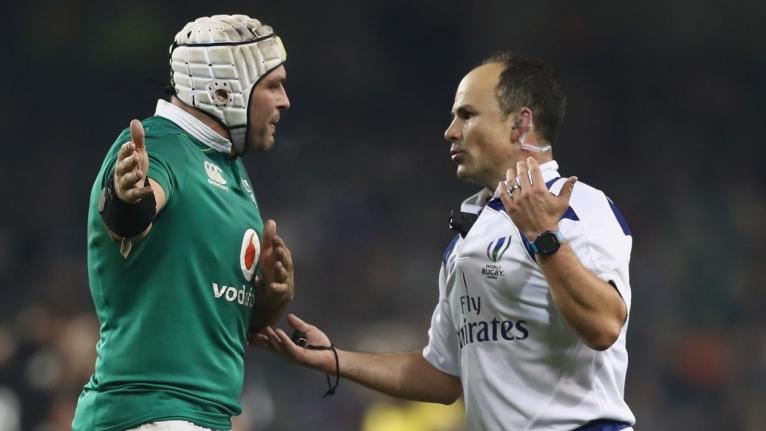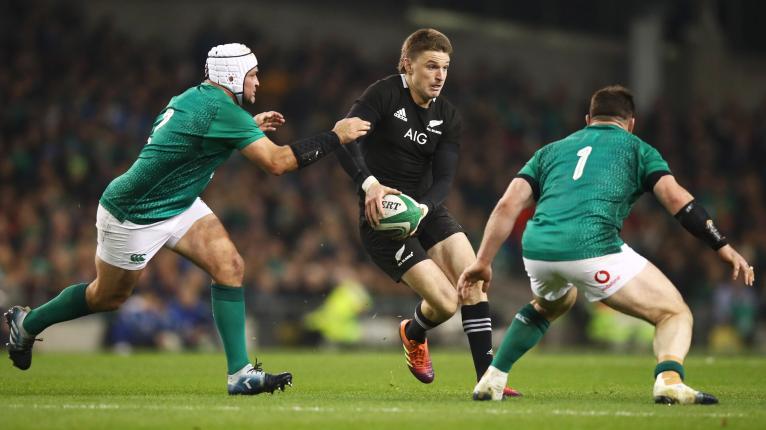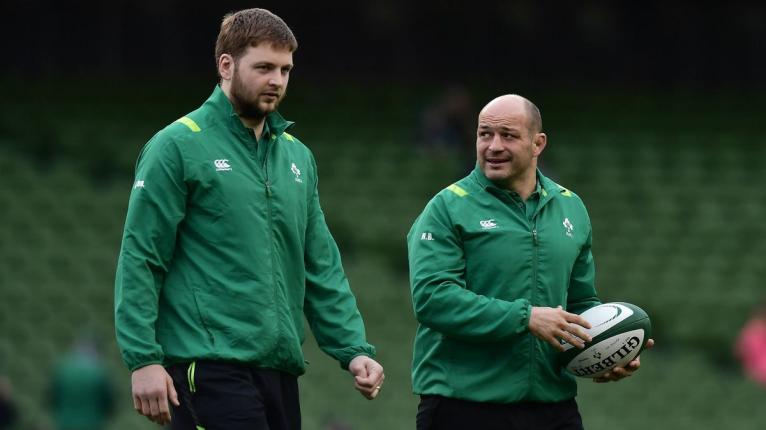Thirteen years after he endured an All Black hammering on debut, Rory Best has given his detractors the proverbial fingers

Saturday night in Dublin was supposed to demonstrate how Test rugby is no country for old men.
Rory Best was apparently over the hill. His legs allegedly no longer had it in them to efficiently get him around the park. And neither did he have any business leading Ireland out as their oldest ever skipper at the age of 36, not with a World Cup on the horizon in 10 months’ time.
Rubbish on all three counts.
Just over 60 minutes later, sporting ageism was emphatically given the two fingers. Best walked away having produced arguably his finest hour in the green jersey, playing an integral part in snookering the All Blacks with a richly deserved 16-6 lead that was only reduced by three points in his 15-minute absence.
Cue full-time bedlam. There was Best bouncing around like a mad young thing in a jubilant sideline embrace with fellow front rowers Cian Healy and Tadhg Furlong, the latter a prop who was 10 years younger than him.
Old man? Only if you read the birth cert of a player who debuted in miserable circumstances 13 years earlier against New Zealand, coming off the bench in a 7-45 drubbing at an old Lansdowne Road where the entire Havelock Terrace was closed due to overnight fire damage.
Saturday’s cloud was different. Best took the pitch 35 months older than the next oldest Irish player (Johnny Sexton). Thirty-eight months older than the oldest Kiwi in town (Kieran Read). And a whole heap of criticism weighing on his nuggety shoulders following his largely anonymous impact seven days earlier versus Argentina in just his fifth club and country appearance of an injury-hit season.

Time’s up was the accusation. Time for more, much more, was his compelling riposte. The first 10 minutes energetically illuminated the difference.
A week ago there was a horrifying look of resignation on his face watching Bautista Delguy slither in at the corner. Best was the closest to the Argentine scorer but he may as well have been a million miles away. This weekend, though, there was no missing-in-action aberration, Ireland’s taking of an early lead providing a snapshot of his effectiveness.
Not only did the skipper accurately hit Peter O’Mahony at a lineout on the 22 after Sexton guided a penalty down the line, Best bashed into five of the ensuing 11 rucks as a cleaner.
That included assisting Keith Earls to recycle at a breakdown on the far side of the pitch from where the initial set-piece took place, and he was visible again at the final collision back near where the play had initially started before the referee called a halt and Sexton dissected the posts off the tee.

So much action, so much fine detail to pick over and savour. Best will never win accolades for his ball carrying. Saturday witnessed just a four-metre gain, the joint lowest mark of the starting Irish eight, off a half-dozen runs.
One featured the turnover that resulted in Rob Kearney conceding the penalty that allowed Beauden Barrett tie up the scores at 3-3 on 16 minutes. There was also a misplaced pass that cost further attacking momentum later in the opening half. But what the veteran contributed in the tackle (10 successfully completed) and around the breakdown ( a constant white-cap presence) helped his team physically dominate their opposition.
Then there was the dependability of his throwing and his quality scrummaging, one in the eye for Kiwis who had placed an asterisk alongside Ireland’s breakthrough 2016 win in Chicago. Their engine room duo, Brodie Retallick and Sam Whitelock, had missed that defeat and they returned to turn the tables a fortnight later in Dublin.

Twenty-four months later, these twin terrors were made to look ordinary. Only when Sean Cronin replaced Best did the Irish lineout encounter a wobble, losing two throws on the bounce in contrast to the variation and accuracy of the starting hooker’s 10 throws.
Best had also been part of the scrum that won two first-half penalties with opposition-crumpling heaves before he looked imperious when smashing Retallick in a second-half collision shortly after he had played an astute distracting role in Jacob Stockdale’s crucial try.
Having found O’Mahony at a halfway lineout, he cannily took up the left wing position before the ball came back Stockdale’s way and his eagerness to run a decoy support line outside the youngster was enough to draw in Ben Smith and invite Stockdale to chip and win his chase to score.

That little cameo encapsulated the value of Best’s considerable 112-cap experience, but it was his calm, composed dealings with referee Barnes that highlighted precisely why he is – and will remain – Ireland captain. Not O’Mahony or Sexton who can become over-exuberant in their communications.
Best has a gentlemanly way with words that can’t be underestimated and his role in ensuring Barnes wasn’t a derogatory post-match talking point on Saturday night was important.
Last June, with O’Mahony as skipper, Ireland’s discipline struggled despite their series win in Australia. Four yellow cards were coughed up along with 35 penalties. To concede just five penalties and no cards against the try-less All Blacks was an excellent reflection on Best’s on-pitch leadership.

It was January 2016 when he first took a phone call at home in Gilford from Joe Schmidt asking him to succeed the retired Paul O’Connell as captain ahead of Jamie Heaslip. He jumped at the opportunity.
Thirty-four Ireland games later, Best has skippered his country in the 24 Tests he has started – Rhys Ruddock five times, O’Mahony four and Heaslip one have been the other match captains.
But he has had to fight his corner along the way despite his 67% win ratio (16 wins, the last 10 on the bounce). A year ago he flatly dismissed speculation he was under pressure to hold on for the November 2017 series, revealing Schmidt had told him the previous August he was captain for the entire season.

He then courted controversy last January when he attended the Belfast rape trial of Ulster colleagues Paddy Jackson and Stuart Olding and despite leading Ireland to the Grand Slam two months later in London, speculation about his position continued.
His drop in form versus the Pumas only added fuel to the fire, but Saturday night’s masterclass should now surely go a long way towards dispelling doubts that he won’t be capable of competently leading Ireland at the World Cup next September a month after his 37th birthday.
Best is one of seven centrally contracted players whose deals expire in November 2019, so confirmation is expected this winter on what his future plans beyond the finals are.
In the meantime, only Niall Scannell (six occasions), Rob Herring (twice), Cronin and James Tracy (once each) have worn the No2 jersey since Best came to power. Barring injury, it’s difficult to see any of them dislodge him as first choice before he reaches the Far East.
Japan reportedly has the world’s oldest population. Best should fit in very well then, Saturday’s inspired effort giving every reason why the oldest of Ireland’s 50 team captains in a list stretching back to 1884 can bow out with a bang next autumn.




























































